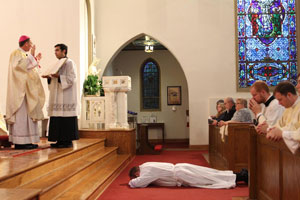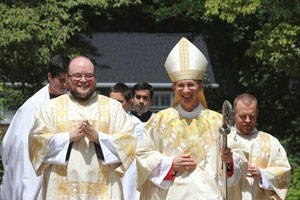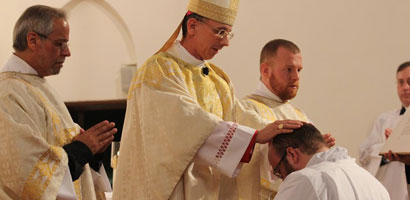 Cory Catron ordained to the transitional diaconate May 30
Cory Catron ordained to the transitional diaconate May 30
CHARLOTTE — St. Patrick Cathedral was the site where one man's life changed forever today. Aaron Cory Catron was presented by Father Christopher Gober, director of vocations for the Charlotte diocese, to Bishop Peter J. Jugis and the lay faithful as a candidate for the transitional diaconate. After vouching for his character and preparedness, Father Gober then asked Bishop Jugis to accept Catron for the ordination to the diaconate.
A resounding round of applause went up as Bishop Jugis gave his approval.
Catron was then asked to stand before Bishop Jugis and the congregation made up of priests, deacons, religious men and women and laity to profess his fidelity to the Catholic Church and his bishop. He was then seated before the bishop at the base of the sanctuary steps for the homily.
"Dear brothers and sisters in Christ, Cory Catron is now to be advanced to the order of deacons through the laying on of hands and the prayer of ordination," Bishop Jugis said.
He explained that Catron would receive the gifts of Holy Spirit in ordination to help the bishop and his priests in the Ministry of the Word, of the Altar and of Charity.
"He (Catron) will demonstrate that he is a servant, a servant to all, following example of Jesus, who came not to be served but to serve. As a minister of the Altar he will proclaim the Gospel, prepare the Sacrifice, and distribute the Lord's Body and Blood to the faithful.
"As minister of the Word he will instruct believers and non-believers in the doctrine of Christ, and he will preside over public prayer, assist at and bless marriages, bring viaticum to the dying, conduct funeral rites and administer baptism."
Bishop Jugis explained that in the reading from the Acts of the Apostles during the diaconate Mass which spoke of the deacon, Philip, St. Luke shares the story of how the deacon ran to catch up with a chariot to speak to the man riding in it.
"He took the initiative and asked the question of the chariot passenger 'Do you understand what you are reading in the prophet Isaiah?' We see a beautiful example of enthusiasm, engaging himself in the ministry," Bishop Jugis said.
"He took the initiative, instructing the man in the doctrine of Christ, proclaiming Jesus to him. Then he administered the sacrament of baptism when the court official requested to be baptized."
According to St. Luke, Philip was then snatched away by the Holy Spirit and he went about proclaiming Jesus to all of the surrounding towns as far as Caesarea.
"Such enthusiasm, engaging himself in the diaconal ministry," Bishop Jugis noted. "This whole reading is a perfect example not only of diaconal ministry, but of Pope Francis' teaching on personal encounter as a most effective method of evangelization, bringing Christ to others through a personal encounter with them. Certainly Deacon Philip models diaconal ministry for us in an exemplary way."
 Bishop Jugis also explained that the Ministry of the Word and the Ministry of the Altar are also accompanied by the Ministry of Charity, which is also an essential part of the work of deacons from the beginning.
Bishop Jugis also explained that the Ministry of the Word and the Ministry of the Altar are also accompanied by the Ministry of Charity, which is also an essential part of the work of deacons from the beginning.
"What could be a greater work of charity than to devote oneself to the salvation of another?" he asked.
The Gospel reading from Matthew 5:13-16, was particularly appropriate for the diaconate Mass, Bishop Jugis said, as it reminds us ‒ particularly those called to Holy Orders ‒ that followers of Christ are to be 'the light of the world' and must 'let their light shine before others' so that they may see our good deeds and glorify our heavenly Father.
At that point, Bishop Jugis addressed Catron directly. "Now dear son, you are to be raised to the order of the diaconate. A whole new life opens before you beginning today; the life of an ordained minister of the Church.
"You will now be changed by the action of the Holy Spirit. He will mark you with an indelible character to configure you to Jesus Christ who came as the Servant of all...You are united to Christ the Deacon, the Servant, through the sanctifying grace of diaconate ordination.
"You must also from this day forward, every day, unite yourself to Christ seeking to configure yourself to Him."
Bishop Jugis reminded Catron that he needed to exercise this ministry in the celibate state, because "Celibacy is a sign and expression of your pastoral charity and the source of spiritual fruitfulness in the world. It enables you to be more free in service of God and in service of others.
"Remain united to Christ in a most profound way through your prayer every day. He is your close friend, your close companion."
Bishop Jugis then recalled that the Apostles enumerated some perfect qualities for deacons as the first deacons were known to be men of good reputation, filled with Holy Spirit and wisdom.
"And so must you be, of good reputation, your conduct always beyond reproach as a sacred minister."
He also recounted how St. Paul in his Second Letter to Timothy, wanted deacons to be dignified, which demanded that they held fast to the mystery of faith with a clear conscience.
"And so must you do, firmly rooted and grounded in the faith so that you may teach what comes to us from the Apostles; that you may teach Jesus who is the Way, the Truth and the Life."
After the homily, Catron approached Bishop Jugis, placing his hands in the bishop's hands, vowing his obedience to him. Then Catron descended the sanctuary stairs and lay prostrate on the floor during the Litany of the Saints, while all gathered sang in unison.
Upon rising from the floor at the conclusion of the litany, Catron again approached Bishop Jugis in the sanctuary and knelt while Bishop Jugis laid his hands upon his head, invoking the Holy Spirit. At the conclusion of bishop's prayers, now Deacon Catron descended the sanctuary to be vested by transitional Deacon Casey Coleman and permanent Deacon Ruben Tamayo. His parents, Jerry and Mia Catron, and family sat in the front pews, proudly watching his vesting.
After being greeted by the priests and deacons assembled for the diaconate Mass, Deacon Catron prepared the altar for the Liturgy of the Eucharist. He then assisted Bishop Jugis at the altar, distributing the Precious Blood at Communion.
During the Mass, Bishop Jugis encouraged Deacon Catron in his ordained ministry saying, "Through your faithful service, may you be blessed to hear the Lord say to you on the last day, 'Well done, my good and faithful servant, enter into the joy of your Lord.'"
— SueAnn Howell, Catholic News Herald. Photos by SueAnn Howell
 Aaron Cory Catron
Aaron Cory Catron
Home parish: St. Frances of Rome Church, Sparta; originally St. Mary, Mother of God Church in Wytheville, Va.
Raised in: Rural Retreat, Va.
Family: Parents, Jerry and Mia Catron; brother, Micah Catron
College: Belmont Abbey College, Class of 2010
Degree: B.A. in Theology and Philosophy
Pre-Theology: Pontifical College Josephinum
Theology: Pontifical College Josephinum
Summer assignments in the diocese: Previously at St. John the Evangelist Church, Waynesville, and Immaculate Conception Mission, Canton, in 2011; St. Francis of Assisi Church, Jefferson, and St. Frances of Rome Mission, Sparta, in 2012; St. Vincent de Paul Church, Charlotte, in 2014
Interests/hobbies: "I like to read and write, and also to be outdoors ‒ fishing, hiking, camping and boating. Having been raised by a librarian I have a broad and eclectic taste in books. I find writing to be a helpful spiritual discipline sometimes, and use it almost as a form of contemplative prayer."
Q&A with the new deacon
CNH: When did you first realize you had a vocation to the priesthood?
Deacon Catron: I think the thought of priesthood was there sometime when I was in high school – particularly later on, junior and senior year. I was raised Catholic but didn't really come to appreciate and understand my faith and to learn more about it until I began reading up on it in about the ninth grade. As I grew in my understanding and my prayer life, a vague attraction to the priesthood began.
Going to Belmont Abbey was hugely catalytic to bringing that into focus, as was attending the Eucharistic Congress each year. I think the Congress in 2006 was the first time I had a concrete sense that God might be calling me to the priesthood. I felt a certain peace as I walked behind the Blessed Sacrament, almost like something was telling me to follow.
CNH: Who has mentored you or given you a good example to follow during these years of discernment and seminary studies?
Deacon Catron: First, my grandfather, who passed away in 2005, was a tremendous example of faith, family and learning. It was his books about Catholicism that I inherited and that paved the way for me initially. My parents, of course, were supportive the whole way, particularly once I had a clear vision of where I might be headed.
The monks at Belmont Abbey, particularly Abbot Placid, Father Kieran, Father Arthur, Brother Edward and Brother Andrew, whose friendship and guidance throughout the years I was in college and thereafter, were a constant help. And Father James Stuhrenberg, who was my summer pastor in 2012, is a shining example of priestly joy and fraternity.
CNH: What would you like to say to young men who may have a call to the priesthood?
Deacon Catron: Prayer is absolutely essential. Prayer, and realizing that God puts certain people in your life at certain times to teach you something. Sometimes the lessons are a joy, sometimes they are very difficult, and sometimes the difficult lessons open you to the more joyous ones.
Be aware of the ways in which He can be working in your life. Know that you're not alone in your desire to do His will, and seek the friendship of those who will bring that out. Seek also people who can help you in your struggles – in which you are also not alone.
CNH: Is there any comment you would like to share with our readers about becoming a transitional deacon here in the Diocese of Charlotte?
Deacon Catron: I am grateful for the prayers and sacrifices of such a wonderful diocese over the years. I am very blessed to be called to serve here, and I can't wait to get to work serving you.
— SueAnn Howell, senior reporter



 Cory Catron ordained to the transitional diaconate May 30
Cory Catron ordained to the transitional diaconate May 30